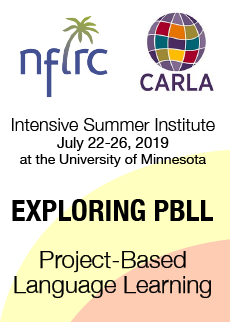Registration information coming soon
Project-based language learning (PBLL) connects the language classroom to the world beyond through learners’ focus on challenging problems or questions as an organizing principle for learning. In the first part of this institute, participants will examine established principles and standards for high-quality project-based learning (HQPBL) as well as issues and concerns specific to PBLL, such as how to apply the concept of “sustained inquiry” at the Novice level. Participants will engage in guided project idea generation and peer critique, exploring how better to connect with community partners and a public audience.
In the second part of the institute, the participants will choose one of their favorite project ideas and flesh it out by aligning to standards, establishing learning outcomes and corresponding assessments, developing one or more assessment rubrics, and designing scaffolding for language, content, interactions, process, product, and use of technology.
Learning outcomes
Participants will develop, integrate, and apply professional knowledge, skills, and expertise in the following:
-
Develop and outline a compelling and contextualized project-based language learning project: Using the Product Square and other design tools, you will develop ideas for language learning projects that integrate the principles and best practices of PBL to foster development of 21st century skills and achievement of language standards.
-
Foster language proficiency development: You will plan for proficiency development across the three modes of communication through appropriate communicative events embedded in project-based language learning experiences.
-
Employ effective scaffolding strategies: Using formative assessment and constructive feedback, you will support learners in tasks that contribute toward final achievement of learning outcomes by scaffolding language, content, interactions, process, product, and use of technology.
-
Design and implement effective assessments: You will learn how to derive clear and measurable learning outcomes from your project idea; assign and evaluate a culminating product based on clear expectations and evaluation criteria; identify formative assessment needs; implement formative assessment to assist learning (including regular comprehension checks); develop effective rubrics; and use results for curriculum improvement.
-
Experiment with a variety of technologiesand use appropriate technologyfor locating project partners and culturally authentic materials, for gathering relevant content-related resources, for facilitating student collaboration, for engaging learners in communicating with communities of target language speakers, for providing formative feedback, for sharing student work with authentic audiences, and for supporting professional growth.
-
Engage in professional dialogue, collaboration, mentoring, and reflection with colleaguesin ways that expand personal learning networks (PLNs) and professional expertise.
Instructor
![]()
Stephen Tschudi, Specialist in Technology for Language Education at the National Foreign Language Resource Center at the University of Hawai‘i at Mānoa, is a co-author of Encounters: Chinese Language & Culture published by Yale University Press. He develops and delivers professional learning resources for online and hybrid language teaching and learning, and is especially interested in cohesion and community in online interaction, the design of online intercultural exchanges, and task design.

